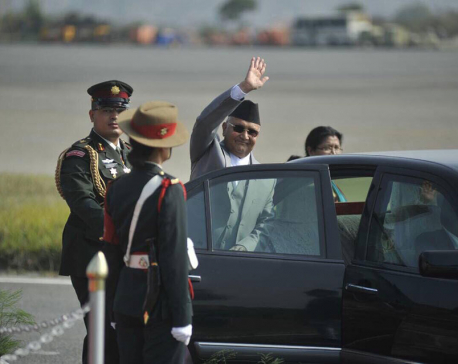
OR
Opinion
Geopolitical Rivalry in World Order: Lesson for Nepal
Published On: September 2, 2023 09:15 AM NPT By: Naren Khatiwada

Critics argue that the international political and financial systems, created by the USA following the Second World War (1939-1945), are in a state of crumbling. The foreseeable international system cannot be predicted with certainty in the present context. Nonetheless, the hegemony of the West, particularly the USA, will not remain the same in the multipolar world, a situation in which more than one superpower exists, as it has been exercised since the dissolution of the Soviet Union from 1991 to 2017. In light of this global context, some foreign relations pundits argue that the world has entered a new Cold War in various forms and shapes. It is unprecedentedly manifested in the warfare between the USA and China in cutting-edge technology, trade and investment, and geopolitical rivalry.
Despite some foreign policy fiascos, the USA still ranks as the superpower in the international arena in terms of technology, economy, and military might. Pundits argue that it will remain the most influential and powerful country for some years. According to Graham T. Allison, an American political scientist, from the Peloponnesian War (431–404 BC) to the present day, the existing great power (USA) needs to ensure the status quo, while the rising/revisionist power (China) threatens to displace the existing great power as a regional or international hegemon. To achieve such visions, both powers have flexed their muscles in various geo-strategic places around the world. The Russian-Ukraine war, the tussle in the South China Sea and Taiwan, the rapprochement between Saudi Arabia and Iran, the recent coup d'état in Niger, and the effort of de-dollarization, to mention a few, are all geopolitical products of the rivalry between the USA and China.
In this geopolitical rivalry, the USA and China have created numerous alliances to balance power. Both countries seem to exploit opportunities at the expense of others. Notably, the Shanghai Cooperation Organization and BRICS are major alliances initiated by China to counter US hegemony. At the same time, the Quadrilateral Security Dialogue, Indo-Pacific Strategy, and AUKUS, led by the USA, are major alliances aimed at containing the rise of China as a regional or global hegemon. Amid this rivalry, the BRICS summit, a group of Brazil, Russia, India, China, and South Africa, recently held in Johannesburg, South Africa, added six more countries: Iran, Saudi Arabia, Egypt, Argentina, the UAE, and Ethiopia, to be effective from next year. With this, BRICS has become a powerful geopolitical bloc, representing 36 percent of global GDP and 47 percent of the world's population. Critics argue that this bloc could be used to diminish the value of the G7, a group of seven wealthy nations (USA, Canada, Italy, France, Germany, and Japan), in the foreseeable future.
With the fifth-largest economy, India has adopted an ambiguous foreign policy over the decades. On one hand, it is an active member of QUAD and the Indo-Pacific strategy, both designed to contain China. On the other hand, it is also a member of the Shanghai Cooperation Organization and BRICS, aimed at countering Western hegemony. It is said that one cannot cross a river by putting their legs into two boats at the same time safely. In this backdrop, it can be conveniently argued that sooner or later, India will have to choose its independent foreign policy trajectory.
As of this date, the West seems to view Nepal through the prism of the Indian establishment. When India adopts an unambiguous foreign policy, it creates significant ramifications for Nepal's geopolitical position. Hence, the foreign policy establishment in Nepal should be prepared for this potentially challenging scenario in the foreseeable future.
There is no doubt that the One Belt and One Road initiative, also known as the BRI, initiated by China in 2013, has geopolitical intent. Although it is the largest economic project ever seen in human history, the crux of this project is to challenge American dominance and secure an eminent position in the anarchic world system, as argued by realists. With aspirations of socio-economic development, Nepal joined the BRI in 2017. At the same time, Nepal agreed to take the project known as the Millennium Challenges Corporation (MCC), a project of $500 million granted by the USA, though it was ratified in 2022 through parliament. Just as in the case of the BRI, some critics argue that the MCC is a geopolitical tool aimed at furthering the strategic goals set in the Indo-Pacific strategy. Knowingly and unknowingly, Nepal has entered into a web of geopolitical rivalry between the USA and China within its own land. It seems that Nepal does not have a convenient way of retracting these initiatives. Instead, the appropriate option is to accomplish the projects while taking both great powers into confidence. If Nepal is unable to balance its relations with these great powers in terms of executing the projects, its sovereignty could be in jeopardy.
Around the world, various small countries have experienced turmoil and upheaval due to a lack of adroit skills in analyzing geopolitical rivalry and adopting the right policy. Ukraine, a buffer state between Western Europe and Russia, is at war with Russia, a nuclear power, to protect its territorial integrity and sovereignty. Millions of people from both sides have been displaced, thousands killed and billions of dollars worth of property have been destroyed. How it will end is still unclear. Whether Vladimir Putin, the Russian president, or Western governments are responsible, that could be discussed at great length. Nevertheless, one thing is apparent: the foreign establishment of Ukraine could not properly understand the geopolitical position of their country and the geopolitical rivalry of superpowers in terms of applying foreign policy.
In this backdrop, the foreign policy establishment of Nepal and political leaders must learn from the geopolitical rivalry between the great powers occurring around the world and adopt an independent foreign policy based on the non-aligned movement and the five principles of Panchsheel.
You May Like This

What Nepal needs is India's friendship and support for growth: Nepal PM Oli
In an exclusive interview to The Hindu, Mr. Oli says the bitterness of past relations have been put behind them,... Read More...

Nepal, other five teams vying for World Cup qualifier spot
KATHMANDU, Feb 6: Nepal will complete a full circle taking the field on February 5 for their Division 2 match against... Read More...

Nepal surrenders to Afghanistan in U-19 cricket world cup qualifiers
KATHMANDU, July 20: Nepal U-19 Cricket Team’s winning form in the ICC U-19 World Cup Division-1 Asia Qualifiers came to an... Read More...



Just In
- Sunkoshi-Marin Diversion Project’s tunnel construction nears completion, breakthrough scheduled for May 8
- Govt tightens security arrangement for Third Investment Summit 2024
- Pesticide residue found in vegetables in Nepalgunj
- Aam Janata Party and Samajwadi Jana Ekata Party merge
- 1,600 participants confirmed for Nepal Investment Summit
- Ilam-2 by-elections held peacefully, vote count likely to start tonight
- NEA schedules five-day power cut across Kathmandu Valley for underground cable installation
- Hundreds of passengers including foreign tourists in distress as poor visibility halts flights to and from PRIA









-1200x560-wm_20240427144118.jpg)





Leave A Comment